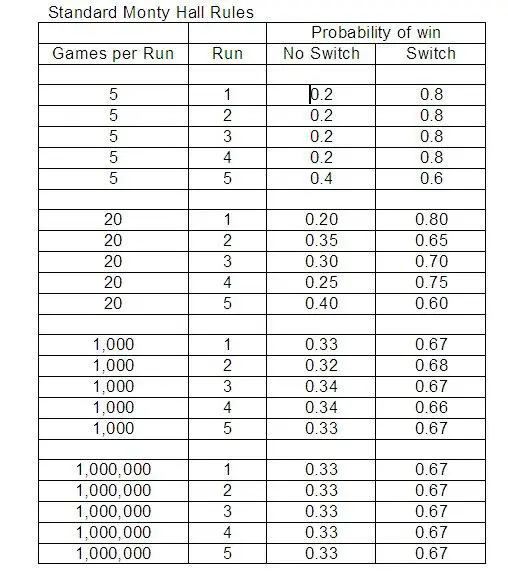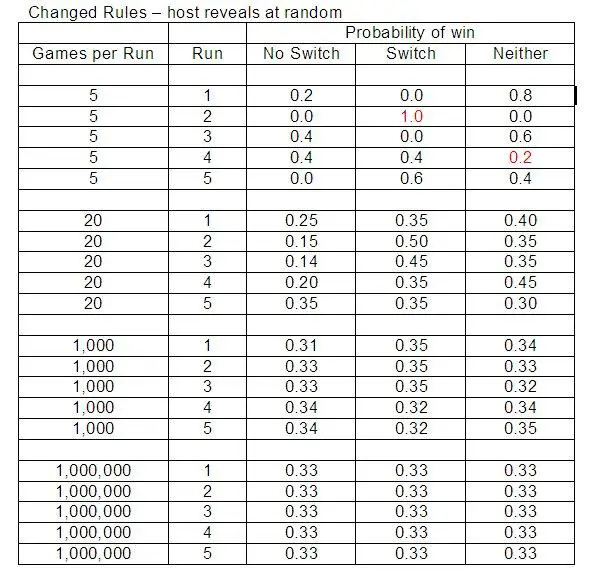I should perhaps clarify what it is that most of the “debate, controversy and passion” has all been about ....Quite - but, as I've been saying to EFLI, the whole thing is incredibly odd, to have generated so much debate, contoversy and passion, from experts and 'lay' people alike, despite the basic simplicity of 'the truth'.
Most intelligent and numerate people do not take too much convincing of what the correct answer actually is, not the least because it can be demonstrated by simulation. As below (**), just a few repetitions of a simulation of 5 games (which can easily be done with ‘scraps of paper’) shows very convincingly the advantage of switching.
The problem all relates to an understanding of why this is the case - i.e. they remained troubled by the fact that they find it hard to 'believe' the answer, even though they 'know' it is true. Many will be fairly easily convinced that the probability of the first-chosen-door winning remains at its initial one-third, regardless of any subsequent happenings, and that obviously means that the probability of winning with the one remaining door (e.g. after switching) must be two-thirds. However, many people (probably most people, at least initially) have difficulty is understanding why/how the probability of winning with that final door (i.e. after switching) rises from one-third to two-thirds following the ‘reveal’.
Plugwash explained this in terms of the probabilities (each one-third) of winning with the ‘two remaining doors’ having been ‘merged together’ into the one door remaining after the reveal, by someone who is constrained by rules and knows where the car is. That is, indeed, the explanation, but people seem to have difficulty in ‘accepting’ it.
Many will, at least initially, claim that there is an inconsistency – that the explanation relies on the fact that the probability of the first-chosen door winning cannot change as a result of subsequent events, yet also relies on the fact that the probability of winning with the door which ends up being the only other choice does change as a result of subsequent events.
There are (at least) two ways of explaining why this is not an inconsistency (i.e. why the reveal changes the probability associated with the one remaining door). The first, which is essentially exactly the same as plugwash said, is that the reveal actually effects the probability of winning with two.of the doors - the probability of winning with the door revealed to have a goat is changed to zero, and since the total probability of winning associated with those two doors together must remain unchanged (at two-thirds), all of that two-thirds probability must then exist in the one remaining door. However, that’s so close to what plugwash said that those unconvinced by plugwash will probably not be convinced by this slightly different way of wording it.
The second way of attempting to explain, again as raised by plugwash, is by pointing out the importance of the fact that the host does not ‘reveal at random’ from the two doors chosen left after the contestant’s choice – he is constrained not to reveal the car. If the host did pick one of those two remaining doors at random to be revealed, no probabilities would be changed and the advantage of switching would therefore totally disappear (****see simulation below). It is only because his reveal is non-random that the probability of winning associated with the one remaining door changes; the host has changed the probability of winning associated with the 'final remaining door' by application of his knowledge of where the car actually is. By analogy, someone who had 'advance knowledge' of, say, the winning number at roulette could alter the probability of a particular bet winning if they 'revealed' (before people placed their bets - or chnaged an initial one) some of the numbers which were not going to win. If they revealed most of the numbers which were not going to win, those who bet on the few remaining numbers would obviously have a much higher chance of winning than had there been no such 'reveal'.
Kind Regards, John
** Herewith results of simulations of the Monty Hall game as played. I present the first five results for random simulation runs, with 5, 20, 1,000 and 1,000,000 games per run. As can be seen, the simulation gets very close to the truth’ by 1,000 games/run – but even with just 5 games per run (easily done with scraps of paper), the advantage of switching is quite obvious:
**** If one changes the rules, such that the host picks at random one of the two doors remaining after the contestant has made their choice (i.e. one-third probability of host revealing the car), then the benefit of switching totally disappears; all three doors continue to have the same one-third of probability they always had, whether the contestant switches or not:




